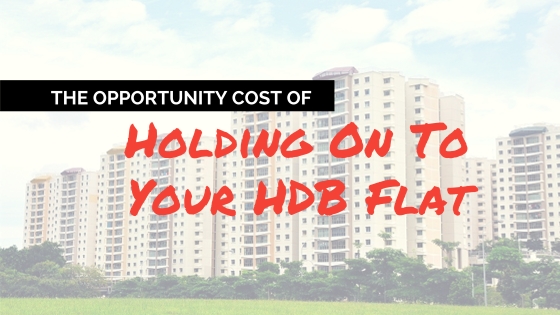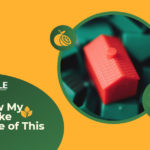
If you have read my previous blog post about the the hidden dangers of accrued CPF interest, you might slowly realize that there is an opportunity cost to holding on to your HDB flat.
Assuming you decide to hold on to your HDB flat, a few things will happen.
You decide to fully utilize your CPF on your HDB property. Basically you are borrowing from your CPF account at a rate of 2.5% interest.
By using your CPF monies to pay for your flat, you lose out on 2.5% interest that can be earned in your OA.
That is an opportunity cost.
What happens IF your flat appreciates SLOWER than the CPF Accrued Interest you are paying?
Assuming you used $400k from your CPF, the accrued CPF interest is about $10k per year. Do take note it is a compounding 2.5% interest rate. You need to use a compound interest calculator to check.
Now, the moment when your HDB flat doesn’t appreciate by $10k that year, you are actually losing your funds.
These are basically funds or “property appreciation” you have made previously from a good property market.
So when the HDB flat gets older and appreciates slower than your interest, then you will end up actually losing a lot of your funds unknowingly.
As more time passes, the CPF accrued interest increases in a compounding manner.
For a bigger principal, the accrued interest will be just become larger and larger.
And at the point when you have fully paid off the HDB, that is when the accrued interest really starts to increase significantly.
For $400k used from CPF, the accrued interest after 30 years is $439k.
Basically, $439K is the opportunity cost of using CPF to pay for your HDB flat.
Even though you might have paid off your HDB loan in full – the CPF accrued interest continues to build up as long as you keep holding on to the HDB.
How about if you rent out the entire flat? (Bear in mind you will need to find another place to stay as well)
Assuming $2k x 12 months x 30 years = $720k Rental Income
However this rental income is NOT guaranteed. At the same time, you also lose 30 years of the HDB lease.
Remember, an older HDB flat might not be attractive to tenants. There is also a good chance that your HDB flat will not appreciate as much once the flat turns 40 years old.
Selective En bloc Redevelopment Scheme (SERS) as the name implies is selective. There is no guarantee that your 30 to 40-year old HDB flat will be selected.
Holding on to a HDB flat and then selling it later to supplement your retirement at age 60 might not be a great idea as well.
Again, we have to be realistic and plan ahead.
However the $439K accrued interest is actually guaranteed – the 2.5% CPF OA interest rate is meant for your retirement after all.
That is why it is very important to do a property portfolio assessment regularly – to review the numbers – to make sure you are not losing unnecessary funds without your knowledge.
Some of the numbers you might need to review:
- Your existing HDB flat valuation
- Your existing CPF OA amounts
- The CPF accrued interest that is payable
- How old is your flat
- Lease left on your flat
- How old are you and your spouse (or property co-owner)
- Loan eligibility
The appreciation of a HDB flat is much slower when compared the appreciation of a private property.
Bearing that in mind, if you and your spouse are still within your 30s, there is still time (not a lot of time) to plan your future property portfolio and decide if holding on to your HDB flat is the best choice.
But as you grow older, and choose to delay making a decision – the choices that are open to you becomes less and less.
Simply put, the older you are, the more limited your choices become.
Remember the problems of financing an older flat will make it hard to sell.
At the same time, as you grow older, your loan eligibility amount also decreases a fair bit.
I invite you to contact me to arrange an assessment on your existing HDB property portfolio. With these numbers, we can make an objective assessment on what is the next best step to take. Click on the image below to fill up the form.




8 Comments
What would be the best period to sell hdb flats in your opinion? Do you think a flat punggol is a good place to hold on?
Hi Mr Chua
It is best to login to your CPF account and check how much accrued interest has built up. If you have reached the end of the 5-year Minimum Occupation Period (MOP), then it is time to review your finances especially if you have intention to upgrade to a bigger HDB. Let me know if you need a free assessment.
I bought my flat after 2011 so i wont be able to get a free assessment?
Hi Zephron
Feel free to contact me at my contact form here if you wish to discuss further. I will do my best for you.
2.5% cpf oa is not guarenteed gotta check ur facts.
Hi Zizi
While 2.5% is not guaranteed, it has been this amount since 2001. We won’t know when CPF is going to revise this amount.
Yes, I agree that the accrued interest is an issue, as it assumes the property bought using those CPF funds keeps appreciating such that when you sell it, the profits can cover the accrued interest.
But I think your sentence of “Basically you are borrowing from your CPF account at a rate of 2.5% interest.” is not correct. Because the accrued interest placed back into CPF after selling the property still goes back to your own OA account. Its still your money. You are not paying the interest to CPF board. You are effectively “forced” to save.
When you took 100k from CPF to buy property, that 100k no longer earns interest from CPF. Its the same logic as if you were to witthdraw 100k from your own bank account and the bank stops paying interest to you for that 100k.
Basically what is happening here is that CPF is meant for retirement, and the 2.5% interest given is to ensure your retirement fund grows over time. When you take out a large sum to finance property over long period of time (e.g. 25 year mortgage), the 2.5% interest is lost. And by forcing you to put back this accrued interest into your own OA account after selling your property, it ensures that you are not circumventing the system. Imagine you made a profit by selling your property after 15 years. And you don’t have to put back the interest. Effectively, you are withdrawing some of your CPF into cash. Compared to someone who has the sum inside his CPF earning the 2.5%, he cannot take out that interest to convert into cash, until he reach the CPF withdrawal age.
I guess the question here is that, if you made a lost on selling property and this has a shortfall to pay back the accrued interest, what will CPF board do to you? Force you to pay back by taking a loan? 🙂
Hi Gongon
You are right – CPF is meant for retirement and it is a good system to ensure we are adequately prepared for retirement.
Your question – If you made a loss on selling your HDB flat, are you required to pay back this shortfall? The answer is by right, you will need to top up this shortfall in cash.
In today’s context, you can write in to CPF to appeal from paying this losses.